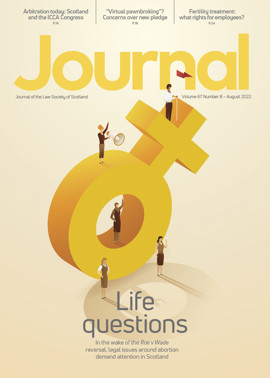Business: a nuanced approach
 Through our laptops and smartphones, every one of us – business leaders, clients and colleagues – has instant access to news and reports from right across the globe.
Through our laptops and smartphones, every one of us – business leaders, clients and colleagues – has instant access to news and reports from right across the globe.
As I write, my inbox contains the usual mix of management reports, updates from and about the good work of our clients and colleagues, and requests for further investment in recruitment, offices, IT and our sustainable business commitments. But interspersed among them I have emails with reports about the energy transition, the UK’s recovery from the pandemic, the possibility of recession, the cost of living crisis, the war in Ukraine, the impact of Brexit, a new Prime Minister and, recently, discussion of the UK’s constitutional arrangements.
Making sense of it all – and what to do about it – can be hard.
As a business, we take a view that risk comes not from any one of these individual factors, but from allowing them to distract us. Sometimes, we have to make decisions when all of the relevant facts are not available. And in doing so we must seek out the nuance. Events – like decisions – can seldom be reduced to a simple good or bad, or a yes or no. It is the nuance that our clients often come to us for, and which their experiences teach us.
Planning for uncertainty
Our firm operates, as most do, to a set of strategic plans. In our own case, we operate to a three-year strategic cycle. In arriving at our plans we try to anticipate forthcoming legal, economic, regulatory and political factors that might influence legal services and client demand for them. In more recent times we added constitutional discussions to the matters that we consider.
When we look at those forthcoming events, our job is not to anticipate them and then hope they turn out as “we” might prefer. That’s a conversation to be had with a bookmaker. Our job is, instead, to anticipate the likely outcomes, and to have plans which see the firm make progress in each one of those scenarios. That progress might be different in each scenario, but in every one it must represent progress.
The more recent discussions about Scottish independence are a case in point. It is not our job to speculate whether there will be another referendum, or if held how it might conclude – our job is to have plans which see our firm make progress whether there is a referendum or not, and whatever its outcome might be. Those are the plans that we are currently implementing.
In the run up to, and immediately after, the 2014 referendum, net business investment did not stop. Yes, some clients accelerated plans, and others paused or adjusted them. But one learns never to underestimate clients, or their entrepreneurial spirit. We take our lead from their example. In 2014 a good number of clients sought our counsel and from that, combined with continuing investment in our own business, our firm made progress, our income grew, and we recruited more colleagues. That will continue to be our approach to business.
And if I were in any doubt about entrepreneurial spirit, my inbox contains reports of activity right across the range of sectors and clients we work with. They include reports of an increase in investment by clients at all points in the energy market, from the UKCS to those promoting the newest tidal technologies, or new and alternative lenders entering financial markets, or real estate developers pivoting toward emergent asset classes in the life sciences and “living” markets. I can see businesses, local to us, expanding their own horizons and creating opportunities for us to work with them in North America and the Middle East. And I see the continuation of Scotland’s track record in attracting inward investment in key sectors such as food and drink, energy, technology and life sciences.
Finding the nuance
I mentioned nuance. When making our own plans, and when advising clients, our role is to apply the deep sectoral knowledge that being the leading firm in our jurisdiction provides. That knowledge tells us that the implications of any particular event are seldom yes or no. More often they require individuals, businesses and organisations to adjust their own plans to new legal, regulatory and trading environments. Some may pause, or stop, their plans. For others it may be the catalyst they need to start their plans or adjust them – our experience tells us that where some see challenges, others see opportunities, with much of that activity requiring the support of lawyers.
And so, when I talk to our partners and colleagues about the sort of events I mentioned above, I ask them to think about what they mean for clients. In short, to find the nuance.
Regulars
Perspectives
Features
Briefings
- Criminal court: Long road against addiction
- Family: CGT reforms in the pipeline
- Employment: Long COVID as a disability
- Human rights: civil rights not engaged by legal aid bid
- Pensions: A neverending story – fraud update
- Scottish Solicitors' Discipline Tribunal: August 2022
- Property: The RoS arrear: any light in the tunnel?
- In-house: As the workplace evolves







